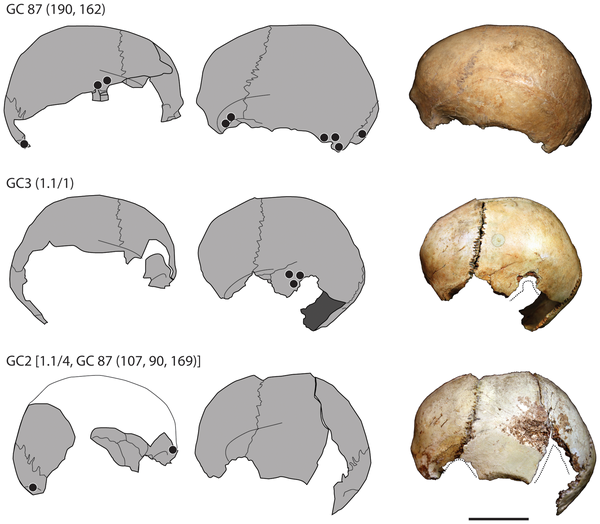Things that caught my eye this week:
(1) Great New Weight Loss Diet!!!: Man loses 7 pounds in his first 3 days on the “dog food diet.”
Let’s see, that’s 2.3 pounds per day, which if it came from fat would be a calorie deficit of 9,500 calories per day.
Are we really sure this isn’t the “look at dog food and decide not to eat it” diet?
(2) Even Our Bugs Have Bugs: The bacterium C. pneumoniae which contributes to so many diseases is often infected itself, by an even tinier bacteriophage. Infected C. pneumoniae is less dangerous to us. (Source: Hoestgaard-Jensen K et al. Influence of the Chlamydia pneumoniae AR39 bacteriophage ?CPAR39 on chlamydial inclusion morphology. FEMS Immunol Med Microbiol. 2011 Feb 23 http://pmid.us/21348900.)
(3) Early Elective C-sections Not Good: The Wall Street Journal has the story:
[A] growing body of medical evidence indicates that gestation even a few days short of a full 39 weeks can lead to short- and long-term health risks….
A 2009 study in the New England Journal of Medicine found that of 24,000-plus repeat elective C-sections, more than a third were performed before 39 weeks. The risk of complications, including respiratory distress, seizures and bloodstream infections, increased even among babies delivered in the last three or four days of the 38th week.
According to the National Institute of Child Health and Human Development, infants born at 37 to 38 weeks face problems with brain development and function, including psychological, behavioral and emotional problems.
I was early – not sure how many weeks, but 4 pounds 10 ounces at birth. If I seem to have psychological, behavioral and emotional problems, this may explain it.
(4) Two Incredible Things: I was reading a BMJ editorial, and this paragraph shocked me:
He drew attention to rodent experiments10 showing that adult energy balance can be preprogrammed by administering leptin in utero and in early life. “Might one be able to supplement human milk with leptin?” he wondered aloud in a recent press interview—triggering yet another frenzy of speculation.
First, if giving leptin to pregnant women will make their babies grow up skinny, wouldn’t fat mothers (with high circulating leptin) produce skinny children, and thin mothers (with low circulating leptin) fat children?
Second, does the editor really expect us to believe that a scientist’s musings were greeted with “frenzy”?
(Source: Watts G. In search of fat profits. BMJ. 2007 Jun 23;334(7607):1298-9. http://pmid.us/17585156.)
(5) Dick Cheney has no heartbeat: See here for details.
(6) You Be the Doctor Quiz #2: How do you cure this problem?
I vote for anesthesia in the jugular, or chili sauce on the cheek.
(7) Nature photos: Michel Denis-Huot in Kenya’s Masai Mara National Reserve photographed three cheetahs catching a baby impala – and, because they were not hungry, playing with it before letting it go:
Click the image for more photos and the story.
(8) OxLDL Can Break the Blood-Brain Barrier: This interests me because the blood-brain barrier is important for protecting the brain from infections. OxLDL could be a major risk factor for dementia. Stay away from omega-6 fats! (Source: Lin YL et al. Resveratrol protects against oxidized LDL-induced breakage of the blood-brain barrier by lessening disruption of tight junctions and apoptotic insults to mouse cerebrovascular endothelial cells. J Nutr. 2010 Dec;140(12):2187-92 http://pmid.us/20980646.)
(9) The 10-Minute Cure for Menstrual Cramps: We are guardians to two nieces and a nephew, and one of the nieces was home from college this week. On Friday we came home to find her in bed, suffering from a bad case of menstrual cramps. She looked rather like Little Nell:
I gave her 750 mg of magnesium. Ten minutes later she bounced out of her room, smiling.
She is now a convert – to the belief that chocolate should be eaten daily!
(10) Do They Have a Mud-Wrestling Match at the End?: Gary Taubes (“The man who thinks everything Dr. Oz says is WRONG”) is going to be on the Dr. Oz show Monday. Check out the promo. Looks like fun!
(11) Weekly Video: The National Park Service is doing videos now and some of them are beautiful as well as informative. I thought I knew a lot about Yosemite, but I didn’t expect to see the beautiful coals at 4:30. Meet Horsetail Fall on El Capitan:
















Recent Comments